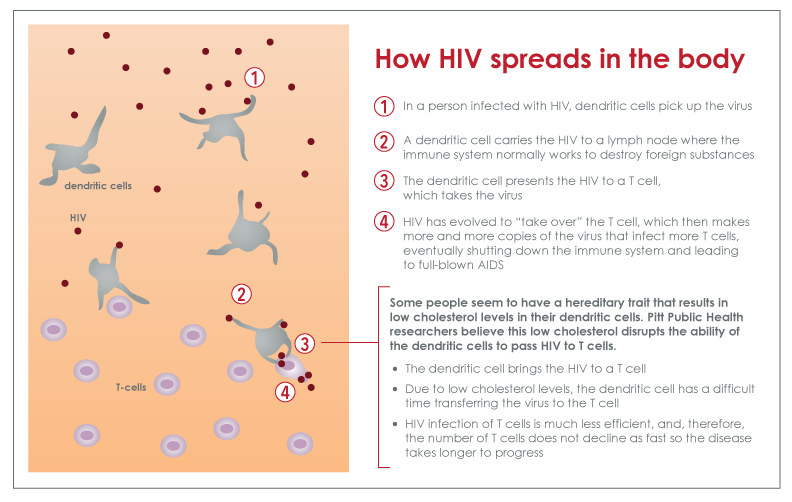Cholesterol metabolism in immune cells linked to HIV progression, may lead to new therapy

Enhanced cholesterol metabolism in certain immune cells may help some people infected with HIV naturally control disease progression, according to new research from the University of Pittsburgh Graduate School of Public Health.
The findings - funded by the National Institute of Allergy and Infectious Diseases, part of the National Institutes of Health (NIH) and presented today at the 8th International AIDS Society Conference on HIV Pathogenesis, Treatment & Prevention in Vancouver - provides a basis for potential development of new approaches to control HIV infection by regulating cellular cholesterol metabolism.
"We've known for two decades that some people don't have the dramatic loss in their T cells and progression to AIDS that you'd expect without drug therapy," said lead author Giovanna Rappocciolo, Ph.D., an assistant professor in Pitt Public Health's Department of Infectious Diseases and Microbiology. "Instead, the disease progresses more slowly, and we believe altered cholesterol metabolism in certain immune cells may be a reason."
Immune cells known as antigen-presenting cells (APCs) can deliver HIV to its primary target - T cells - through a process known as trans infection. HIV then uses T cells as its main site of replication. It is through this mechanism that levels of HIV increase and overwhelm the immune system, leading to AIDs.
However, some HIV-infected people do not progress to AIDS for many years, even without antiretroviral therapy, because their APCs do not effectively trans infect T cells. These people are known as "nonprogressors." A closer look revealed that this defect in trans infection is likely due to altered cholesterol metabolism within the APCs, which appears to be an inherited trait.
This discovery was made possible by using 30 years of data and biologic specimens collected through the NIH-funded Multicenter AIDS Cohort Study (MACS), a confidential research study of the natural history of untreated and treated HIV/AIDS in men who have sex with men. The Pittsburgh arm of the study is the Pitt Men's Study.
Dr. Rappocciolo and her colleagues searched for patterns in gene expression, or the degree to which specific genes are turned on or off, in APCs from eight HIV nonprogressors and eight progressors enrolled in MACS.
"Compared to APCs from progressors, cells from nonprogressors expressed higher levels of several cholesterol-related genes associated with defective trans infection," Dr. Rappocciolo said. "These results improve understanding of how nonprogressors control HIV without drug therapy and potentially may contribute to new approaches to manage HIV infection."



















